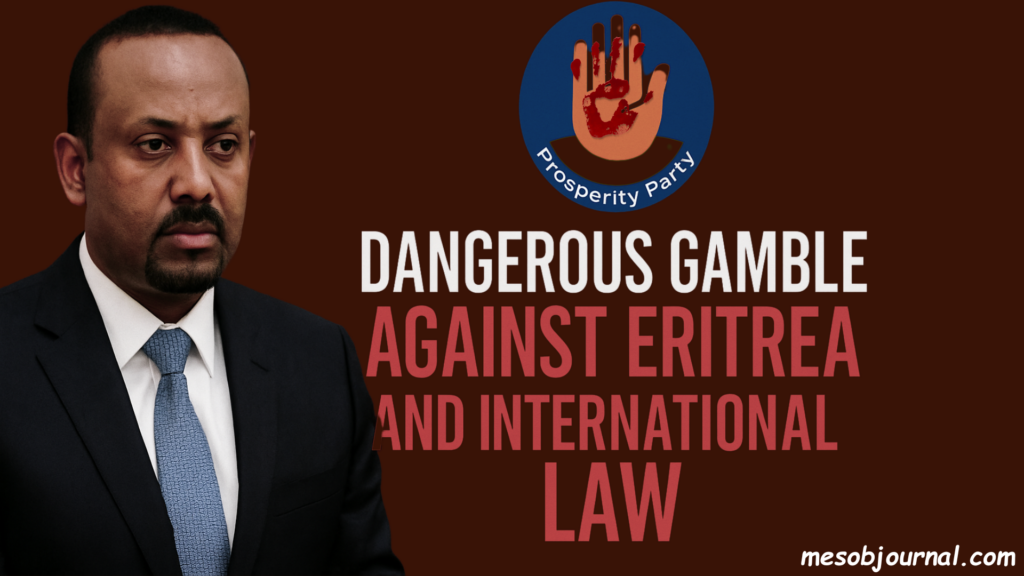Ethiopia’s “Sea Gate” Delusion: The Prosperity Party’s Dangerous Gamble Against International Law

In Addis Ababa’s echo chamber, the Prosperity Party (PP) has just wrapped up its latest congress – a marathon of self-congratulation, selective history, and veiled threats. Between grandiose claims of “victories” and recycled conspiracy theories about “historical enemies,” one line stands out for its sheer audacity:
“We have made our natural and historical right to get a sea gate an international agenda.”
Stripped of rhetorical camouflage, this is not diplomacy. It is the open articulation of a war agenda – an attempt to rewrite borders through force, in direct violation of the UN Charter, the African Union’s Constitutive Act, and the fundamental principle of state sovereignty.
Let’s be clear: no country on earth recognizes this so-called “right”. Not one. There is no clause in any international treaty granting Ethiopia – or any landlocked state – the right to annex a neighbor’s coastline. There are, however, binding laws prohibiting precisely what the PP is now publicly fantasizing about.
The Law Is Not on Addis Ababa’s Side
Under Article 2(4) of the UN Charter, “all Members shall refrain… from the threat or use of force against the territorial integrity or political independence of any state.” The African Union’s Constitutive Act goes even further in Article 4(b) and 4(f), declaring the “respect of borders existing on achievement of independence” and the “prohibition of the use of force or threat of force among Member States”.
Eritrea’s borders were determined by international arbitration, endorsed by the OAU (now AU), and recognized by Ethiopia itself when it became independent in 1993. Any attempt to seize Eritrean ports is not “geostrategic restoration” – it’s armed aggression, plain and simple.
International law offers peaceful mechanisms for landlocked states to access maritime trade: negotiated port usage agreements, transit corridors, and customs arrangements. What it does not offer is the right to invade.
Scapegoating Eritrea – A Convenient Distraction
The PP’s statement drips with familiar code words: “historical enemies,” “traitors,” “extremists.” In Ethiopia’s official lexicon, these terms have become political Swiss army knives – used interchangeably to label anyone who resists the regime’s narrative. Today, Eritrea is cast as the omnipresent saboteur, blamed for everything from internal dissent to Ethiopia’s currency crisis.
This is not new. It is the same diversionary tactic Addis Ababa deployed before and during the TPLF war – externalizing domestic failures to rally nationalist fervor. But no amount of deflection can hide the reality: Ethiopia’s instability is home-grown. Oromia’s insurgency, Amhara’s resistance, Tigray’s fragility, and an economy battered by inflation and debt are not creations of “foreign enemies.” They are the consequences of systemic governance failures.
Eritrea’s Position — Principled and Consistent
Eritrea’s statement at the UN in Awaza this August – as captured in Eritrea at the UN: Sovereignty, Cooperation, and the Red Sea Fallacy – could not have been clearer:
No zero-sum games — Eritrea seeks regional prosperity for all, not at the expense of its neighbors.
No relinquishing sovereignty — In President Isaias Afwerki’s words: “We will not relinquish what is ours, as we do not covet what belongs to others.”
No appetite for manufactured wars — Durable peace and cooperation are the only viable path to shared development.
Minister Yemane G. Meskel underscored the same in his recent rebuttal to PP’s smear campaign: Eritrea is not the aggressor; it is the repeated target of those who covet its resources and strategic position.
The “Sea Gate” is a Mirage
The PP’s “sea gate” agenda is not a visionary policy – it is a pipe dream with no international support, no legal basis, and no realistic military pathway that would not plunge the Horn of Africa into another catastrophic war. The Red Sea is governed by international maritime law and by the sovereignty of its coastal states, including Eritrea, Djibouti, Sudan, Saudi Arabia, and Yemen.
The very notion of unilaterally altering Red Sea sovereignty is a geopolitical non-starter. Even Ethiopia’s closest partners have no interest in legitimizing territorial revisionism, which would set a precedent threatening their own borders.
What Ethiopia Needs — and What It Risks
Ethiopia’s future lies not in reviving imperial fantasies but in stabilizing its domestic front, reforming its political culture, and engaging in mutually beneficial agreements with neighbors. Durable port access can be negotiated – but only on the basis of respect, sovereignty, and mutual interest.
Persisting with this belligerent rhetoric carries risks:
Diplomatic isolation — Alienating regional partners and losing credibility in multilateral forums.
Economic self-harm — Investors flee when war drums beat.
Security implosion — Multiple insurgencies could accelerate if the state diverts resources to an external war.
The Red Line
Eritrea’s position is unambiguous: its sovereignty is not negotiable, not for rent, and not for sale. Any attempt to cross that line will meet the full weight of the UN Charter’s protections for member states – and the political, legal, and moral backlash of the international community.
The Prosperity Party can keep polishing its speeches about “historical rights” and “sea gates,” but the truth is simple: Ethiopia’s path to prosperity runs through peace, law, and cooperation – not through the barrel of a gun aimed at Massawa or Assab.

